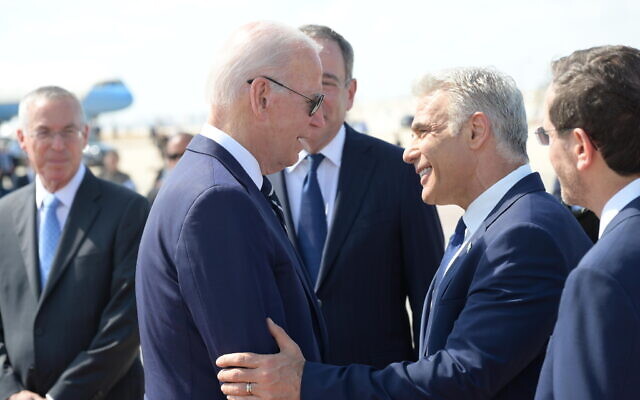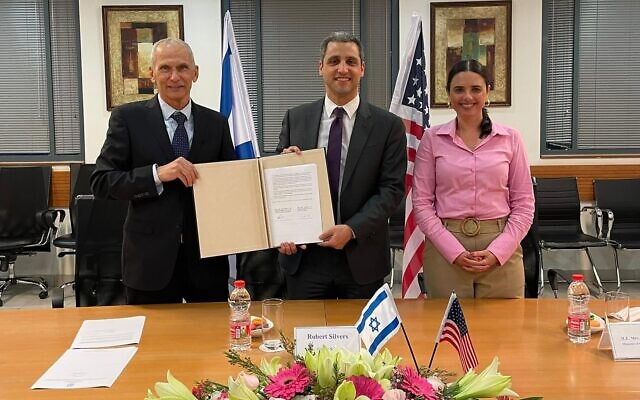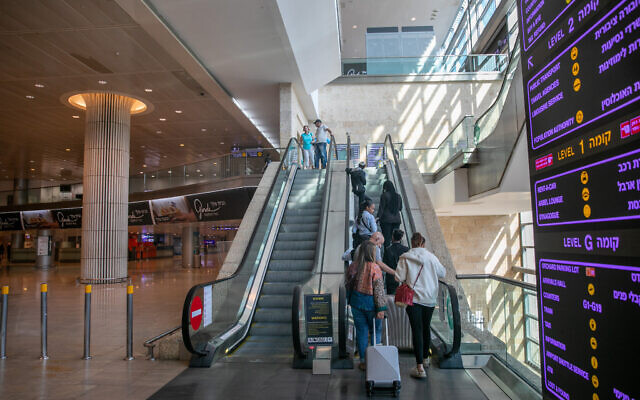Israel released revised guidelines for entry into the West Bank by foreign nationals on Sunday, reversing clauses requiring visitors to notify Israel if any of them start a relationship with a Palestinian, after coming under pressure on the matter from US President Joe Biden’s administration and from European governments.
The Coordinator of Government Activities in the Territories (COGAT), the Defense Ministry body responsible for Palestinian civil affairs, originally published a draft of “Procedure for entry and residence of foreigners in the Judea and Samaria area” in February. The rules were set to take effect in July, but were delayed by petitions to the Supreme Court.
The revised document will go into effect on October 20.
The updated document removed a requirement that a foreigner who starts a relationship with a West Bank resident after entering the territory must notify Israeli authorities within 30 days of their engagement, wedding, or the start of cohabitation — “whichever occurs first.”
“A foreigner married to a resident of the Area, or forming a couple with one, must proceed to make arrangements… before arriving at the Area. If the relationship starts after the foreigner arrived at the Area, then the authorized COGAT official must be informed in writing within 30 days of the relationship’s start. At the same time, an application must be submitted to the Palestinian Authority for formalizing the status,” the original draft had stated.
COGAT removed the online February draft on Sunday as well, replacing it with the new 90-page version, dated September 4, 2022.
The new draft also allows for the extension of foreigners’ visas from 90 days to 180 days. In addition, COGAT removed quotas on visiting lecturers and students at Palestinian universities, originally set at 100 teachers and 150 students. US President Joe Biden takes his leave of Prime Minister Yair Lapid before departing Israel’s Ben Gurion Airport on July 15, 2022, for Jeddah, Saudi Arabia. (Amos Ben Gershom / GPO)
US President Joe Biden takes his leave of Prime Minister Yair Lapid before departing Israel’s Ben Gurion Airport on July 15, 2022, for Jeddah, Saudi Arabia. (Amos Ben Gershom / GPO)
Israel further agreed — reportedly under pressure from US officials — that there would be a two-year trial period in which further adjustments can be made to the regulations. Advertisement
“At the end of the pilot period, the situation will be evaluated and a decision will be made regarding whether to keep the procedure in force,” the document reads.
American concern
Despite the changes, and the release of the revised guidelines, the US government continues to be concerned, with US Ambassador Tom Nides saying he continued to “have concerns with the published protocols.”
In a statement published after the changes were announced, Nides said: “Since February, the US Embassy Jerusalem, the US Office of Palestinian Affairs, and I have aggressively engaged with the Government of Israel on these draft rules – and we will continue to do so in the 45-day lead up to implementation and during the two-year pilot period.
“I continue to have concerns with the published protocols, particularly regarding COGAT’s role in determining whether individuals invited by Palestinian academic institutions are qualified to enter the West Bank, and the potential negative impact on family unity,” he said.
“It is important to ensure all of these regulations are developed in coordination with key stakeholders, including the Palestinian Authority. I fully expect the Government of Israel to make necessary adjustments during the pilot period to ensure transparency as well as the fair and equal treatment of all US citizens and other foreign nationals traveling to the West Bank.”
Shortly before the publication of the updated regulations, a senior embassy official expressed similar sentiment. Advertisement
“We do have concerns over the potential for these policies to reduce foreign travel to the West Bank by foreigners, volunteers, academics, and investors,” said the official, during an online briefing to Israeli journalists, requesting anonymity.
Pledging to closely monitor the impact of the regulations, the official said that Washington “fully expects the Israelis to make the necessary adjustments during the two-year trial period that will ensure transparency, and fair and equal treatment, particularly for all US citizens traveling to the West Bank.”
The US official also praised COGAT, saying it has “modified the guidelines in important ways.” The official pointed to “less onerous requirements” for foreigners in romantic relationships with Palestinians, and the lifting of the academic quotas. COGAT head Maj. Gen. Ghassan Alian in a video message to Gazans on August 5, 2022. (Screen capture/ COGAT)
COGAT head Maj. Gen. Ghassan Alian in a video message to Gazans on August 5, 2022. (Screen capture/ COGAT)
The proposed quotas had drawn a strong rebuke from the European Union, whose Erasmus+ exchange program would have been hit particularly badly.
In 2020, 366 European students and professors took part in courses in the West Bank, significantly more than the overall proposed quota for the next two years.
“While Israel greatly benefits from Erasmus+, the [European] Commission considers that it should facilitate and not hinder the access of students to Palestinian universities,” Education Commissioner Mariya Gabriel said in July.
At the same time, said the US official, there “continues to be concern over COGAT rules about determining whether individuals invited by Palestinian academic institutions are qualified to enter the West Bank.” Palestinian students supporting the Fatah movement wave national and movement flags as they attend a debate, ahead of student council elections at Birzeit University on the outskirts of Ramallah in the West Bank, on May 17, 2022. (ABBAS MOMANI / AFP)
Palestinian students supporting the Fatah movement wave national and movement flags as they attend a debate, ahead of student council elections at Birzeit University on the outskirts of Ramallah in the West Bank, on May 17, 2022. (ABBAS MOMANI / AFP)
The US wants to ensure that the regulations “allow the broadest breadth of academics to come to the West Bank,” according to the official. Advertisement
The official stressed that the US is pushing COGAT to ensure that “relevant Palestinian entities” have a role in shaping the new guidelines.
“It is important to ensure that these regulations empower the long-term development of the West Bank, and that they are developed in coordination with key stakeholders, including the Palestinian Authority.”
Complicated and sensitive talks
The senior official explained that ongoing talks with Israel over a long-awaited visa waiver are “parallel but separate tracks” from the COGAT regulations.
Still, some of the COGAT rules will have to be changed further, in order for Israel to meet the reciprocity requirements for joining the Visa Waiver Program.
“These policies that COGAT will be issuing have an effect on American citizens, as they do on nationals of other countries,” the senior official said. “We will be looking at those closely and continuing the conversation with COGAT and other parts of the Israeli government as we move down the path toward visa reciprocity.”
The VWP allows citizens of participating countries to make short-term visits to the US without having to apply for a visa. Public Security Minister Omer Barlev, US Department of Homeland Security Under Secretary for Policy Robert Silvers, and interior Minister Ayelet Shaked sign an information-sharing agreement in Jerusalem on March 2, 2022. (Courtesy)
Public Security Minister Omer Barlev, US Department of Homeland Security Under Secretary for Policy Robert Silvers, and interior Minister Ayelet Shaked sign an information-sharing agreement in Jerusalem on March 2, 2022. (Courtesy)
All members of the program are expected to grant “reciprocal” treatment to all US citizens at every border crossing. Advertisement
“To become a VWP member, foreign countries must treat all American visa applicants equally; however, Israel has been accused of discriminating against Arab Americans,” according to the US Congressional Research Service.
Granting automatic entry to US citizens from the West Bank and Gaza Strip is expected to be a tall ask of Israel, which regularly limits such passages over what it says are security reasons.
“Anything that wasn’t consistent would need to be changed,” said the official.
“The visa waiver reciprocity requirements, when we get to that point, will supersede some of these COGAT policies that we’ve listed here.”
“We are in complicated and sensitive discussion with the Israeli government,” said the senior official, including on the issue of “extending reciprocal privileges to all US citizens, including Palestinian-Americans.” Travelers at Ben Gurion International Airport, on June 7, 2022. (Yossi Aloni/Flash90)
Travelers at Ben Gurion International Airport, on June 7, 2022. (Yossi Aloni/Flash90)
The official emphasized that the US has made its concerns known to relevant bodies across the Israeli government, and that Washington expects Jerusalem to “listen when we and others express concern over how these regulations are implemented.”
After the February release of the draft, the regulations — which do not apply to those visiting Israeli settlements in the West Bank — came under legal challenge and public censure.





